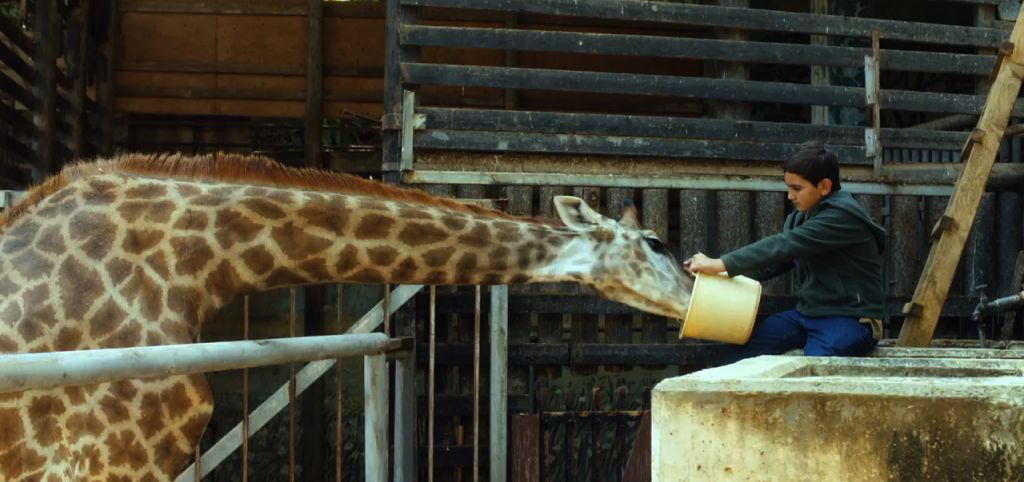
Rani Masshala’s feature debut Giraffada, fresh off its run at Toronto Film Festival is a near perfect choice for a Festival opening night film; a fun and outrageous stranger than fiction, pulled from the headlines premise with heart and brains, if occasionally insubstantial, but it’s had not to see it as a solid crowd pleaser. It’s family friendly, but with satire and political ideas that form a framework and context even when the human and dramatic elements are foregrounded. A strong film that shows promise in the Palestinian national cinema and impressively transcends its most glaring flaw which is using Papyrus font in the opening and closing credits.
Ziad (Ahmed Bayatra) is the son of a veterinarian Yacine (Saleh Bakri) at a local zoo, with a special affinity and attachment to the giraffes, with all their grace, strength and self-evident absurdity; such is Ziad’s obsession that he literally thinks their shit don’t stink, telling his class in an early scene that their excrement ‘smells like grass’ to the taunts and laughter of his classmates. Ostracised by his peers, it’s unclear whether his attachment to the zoo’s giraffes is the reason for his social isolation, or the escape from it. In a film otherwise conspicuously silent on religion, when he is bullied with taunts such as “I heard your father doesn’t even go to mosque, and is going to hell!” it’s hard not to read into an implication, however underdeveloped, as a critique on exclusionary and dogmatic faith in the region, one of the many elements that protect the film from any charges of mere partisanship. The plot is set in motion when an airstrike kills one of the two giraffes 1, and Yacine concocts a plan to smuggle in a giraffe from an Israeli zoo as a mate for the remaining giraffe.
And so begins the motions of the plot, facilitated by Yacine’s fellow vet and friend in Israel Yohav and a French journalist Laura (Played by Roschdy Zem and Laura de Clermont, both of whom turn in solid performances in narrow, thankless and essentially symbolic roles). On a narrative level this is a weak aspect of the film; on paper it reads as a good old heist movie but it plays out as flatter than you might expect. There are a couple of very gripping scenes along the way but as a whole it doesn’t get into the groove of the tension and excitement that a more genre-based approach may have afforded the film, and it suffers slightly. The romantic angle is dropped pretty quickly, and backstory is limited to short lines of dialogue or mild revelations, and the exact mechanics of the operation unfold very quickly. In short, it’s a breezy 80 minute film where a similar Hollywood production of a narrative like this would likely eclipse the two hour mark. The film strays from the narrative elements that mostly tick the boxes on a surface level, and becomes more interesting in symbolism and slice-of-life drama, and that’s where it ultimately succeeds.
The analogy of children growing up in the occupied West Bank with the metaphor of the zoo is one that is effective but could easily become overly obvious, but its deployed with some subtlety here. There are some really impressive visual touches that convey these ideas without derailing the narratives – the shot I remember most from the film is one of Zaid daydreaming in a child’s reverie. Shot from mid-close range, in the background is a giant concrete wall, some twenty metres high, but so out of focus it almost blends into the blue sky behind it, not immediately perceptible for Zaid but another of the many barriers and restrictions upon his freedom that he grows up in. Followed immediately by a giraffe in an enclosed space of a trailer looking out to the same blue sky, it’s a poetic juxtaposition of images that speaks volumes wordlessly. This same sense of regulation of Palestinian life recurs again and again through the film. It’s not always overtly threatening or violent (though there are plenty scenes that are; scenes of armed soldiers enforcing curfew on children with assault rifles are effective not just because of the terror so much as the sheer absurdity of the power imbalance within those encounters), and there are many scenes of characters going through border checks, gates and other regulated thoroughfares that have a relentless and quotidian banality – even occasionally friendliness – to them that you imagine are almost as harmful on the liberties and psyches of inhabitants as open hostilities would be.
It’s impossible to depoliticise a film like this, but documenting life in an occupied and regulated territory and suggesting the impact this has on innocent lives can hardly be considered as merely a highly loaded, partisan stance. And it essentially rises above politics through the symbol of the innocent and oblivious giraffe and the transport operation that is something that only transpires because of altruistic and humanitarian impulses of three individuals 2that transcend ethnographic and physical borders. And ultimately it’s hard not to see this same possibility in cinema as an artform – the film itself is credited as a joint Palestinian-French-Italian-German coproduction, and lead actor Saleh Bakri is a Palestinian actor that has worked to great acclaim interchangeably in both Palestinian and Israeli films. It’s very easy to recommend a film like Giraffada even if some seasoned viewers might expect a little more, and should be an auspicious start to an intriguing Festival line-up of Palestinian cinema.
